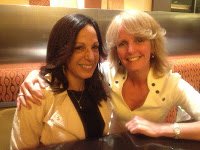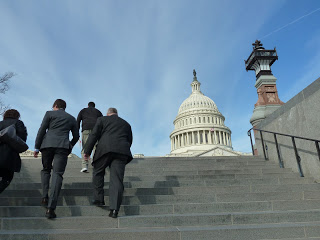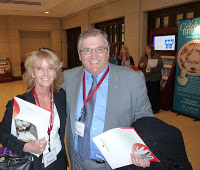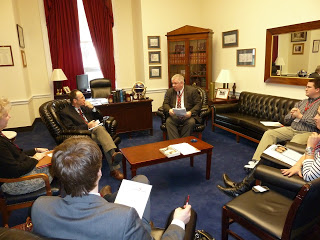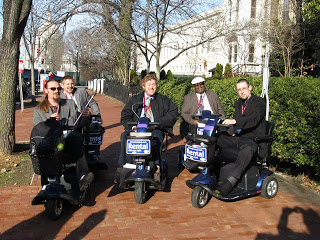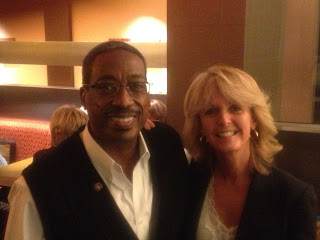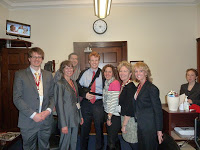Sunny Skies at NHF’s 65th Annual Meeting
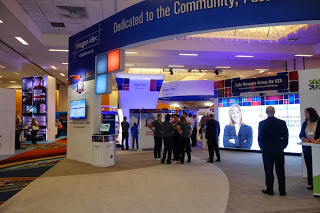 |
| Manufacturers set up large booths to view new programs and products |
still in Anaheim, about to enjoy the sunny California weather for two more
days. I’ve already
community at the 65th annual National Hemophilia Foundation meeting,
with about 3,000 colleagues, patients, families, corporations and friends.
These just keep betting better and better!
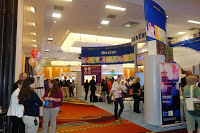 |
| Consumers get to browse many booths |
theme was “United in Progress,” aptly named as all the divergent groups in our
community work together to push our agenda through obstacles such as funding
cuts and insurance threats. While I could only attend a couple of sessions,
they were powerful.
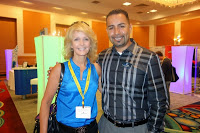 |
| Laurie Kelley with Kevin Shaughnessy |
first was NHF’s Stakeholder Meeting, a comprehensive three-hour session that brought together
key opinion leaders in the US.
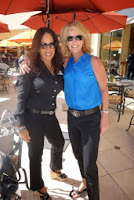 |
| Laurie Kelley with Debbi Adamkin of the Florida Chapter |
Rotellini of NHF first discussed the need to establish conflict of interest
boundaries and policies for chapters working with industry (pharmaceutical
companies and specialty pharmacies). There’s even a need to define “industry,”
as HTCs, half of which sell factor, don’t like to be included as industry. 51
chapters have different guidelines so there’s a need to standardized policies
to industry. A lively debate ensued about how to create a template and work with industry’s legal system to approve this.
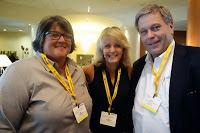 |
| Laurie with Julie Birkofer and Jan Bult of the PPTA |
we had a federal update from Ellen Riker, of MARC Associates in Washington DC. As we all know, the federal fiscal year began October 1. And there is no
appropriations bill for health programs or agencies. So now there is an extension
of current funding levels, with a sequester likely to occur again in 2014. I was
amazed at the low level of funding for HTCs. HRSA/MCHB funding remains flat at
$4.9 million for HTCs and coordinating centers. The CDC receives approximately
$7 million (not a lot) for hemophilia for surveillance, research, outreach and
education (grants to HTCs and patient organizations, all impacted negatively by the 2013
sequester). Most alarming is that the head of CDC doesn’t think chronic disorders
should be in CDC to begin with! So new cuts are a threat. Ellen reminded us
that we would not have gotten through our HIV days without CDC; we need each
other.
update on HR 460 Bill, which NHF is supporting: this prevents private insurance
plans from requiring cost-sharing for drugs on specialty tiers. Only 14% of
health plans using specialty tiers; specialty drug spending represents only 2%
of overall health plan spending. NHF wants to prevent insurance plans from
putting factor in the specialty tier, where copays could be astronomical.
 |
| The legendary Barry Haarde! |
Rice gave an update on the Affordable Care Act “Marketplaces”—those websites
that will allow consumers to compare health care plans to find the right one at
the lowest cost. We learned that the Marketplaces went live just the day
before, and many crashed as huge numbers of consumers logged in! Her own staff
went on the federal site and it was confusing. Michelle presented a great spreadsheet
that will help breakdown the Marketplace by level (denoted by “metal”—platinum,
bronze, etc), by state, etc. This will be a vital and helpful guide for those with bleeding disorders using the Marketplace. Glitches in the Marketplace include: some had navigators but called them different things, which was confusing. Some organizations
are putting up tools based on what feds said would be there but the tools
aren’t right because the feds haven’t followed through with what they said they
would provide!
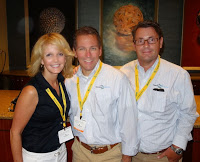 |
| Laurie Kelley withAndy Matthews and Chad Frederickson |
primary message was: be patient. We all have until December 15 to pick a plan for
January 1. Wait before accessing the Marketplace so the bugs can be fixed.
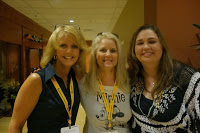 |
| Laurie with hemo moms Elizabeth Pulley and Julie Heinrich |
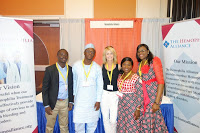 |
| Laurie with friends from Nigeria |
session I attended was about the twinning program of the World Federation of
Hemophilia. Present was Megan Adediran,
my friend and colleague from Nigeria. Megan is the president and cofounder of
the Haemophilia
Foundation of Nigeria, and mother of
two boys with hemophilia. She was present with husband Thomas and another
mother of a child with hemophilia. She gave a fiery speech about the importance
of the twinning program with NHF, to close the gap between two countries, two
worlds, two different approaches to hemophilia. She related how hard the HFN is
working to reach its people in need. Nigeria is a huge country, where only
about 150 people with hemophilia out of approximately 10,000 have been
diagnosed, and where thousands more wait to be identified and helped. It could
take a lifetime to find them, but the twinning assures that we are in this
together for the long haul, United in Progress.
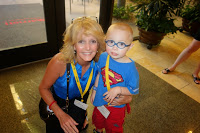 |
| Laurie Kelley with the lovable Tater, who has hemophilia |
was a great meeting, with sessions on social media, von Willebrand Disease,
hepatitis C updates, gene therapy research, obesity, pain management and even
dating when you have hemophilia. There was something for everyone.
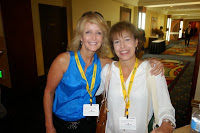 |
| With Debbie de la Riva, former ED of Lone Star Chapter |
is always wonderful to meet up with families I’ve known for so long, going on
23 years for many. One special visitor was 25-year-old Emmanuel, from Ghana,
Africa. I’ve known “Kofi” for about 5 years, when I first went to Ghana, and
now he is attending college in UC Riverside. Living so close, he was able to
take a bus, and was invited in as a guest of NHF. He has factor VIII
deficiency, and is bright, articulate and energetic. It was wonderful to have
him here, especially as he could meet the Nigerians! But I always wish more of
our own US families could attend this remarkable event. I’d like to see a way
to spend less on booths, and more on airfare and hotel for as many families as
possible, to make this truly a community event.
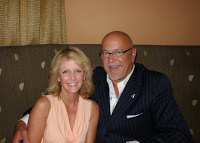 |
| Laurie and Patrick Schmidt, CEO FFF Enterprises and sponsor of 88 children with Save One Life! |
did a splendid job as always of organizing this mammoth event, and we thank
everyone involved, including sponsors and supporters, for mailing this
available. See you in Washington DC next year!
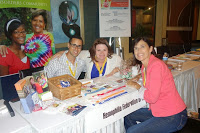 |
| Rich Pezillo, Sonji Wilkes and Jane Smith |
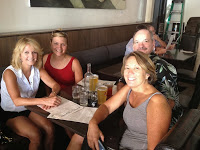 |
| Laurie Kelley with Laurel McDonnell and Paul and Linda Clement |
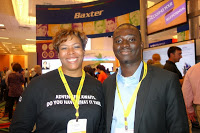 |
| Janie Davis of Baxter with Emmanuel of Ghana |
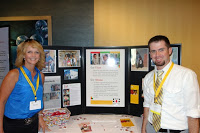 |
| Laurie and Chris Bombardier at Save One Life table |
 |
| Ellen White, RN, who first “discovered” Ghana as a country in need of our help |
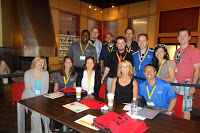 |
| Save One Life sponsors gather for coffee |
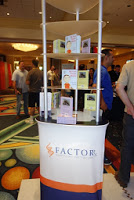 |
| Factor Support Network displays our books! |
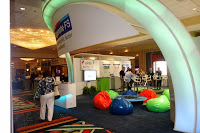 |
| Bayer booth |
 |
| With long time friend Barbara Chang |
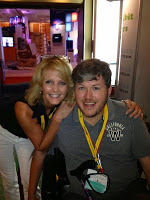 |
| Laurie Kelley with Reid Coleman of NC |
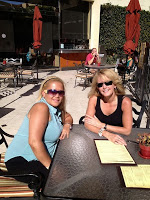 |
| Laurie and Zoraida taking a break |
 |
| Yeah, I met Iron Man! |
 |
| No trip to California without visiting Jim Morrison in Venice, where it all began for the Doors! |


